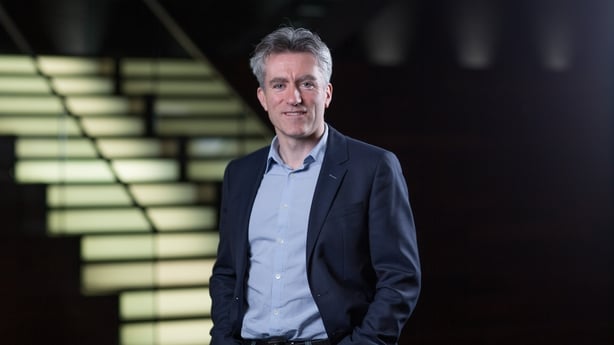Ryanair has today trimmed its profit forecast for the year to the end of March after some online travel agents suddenly stopped selling its flights in December, forcing it to cut fares to fill seats as costs per passenger inched up.
Ryanair had for years accused the web sites of adding illegitimate extra charges and launched a series of court cases against them, but appeared to be taken by surprise when they stopped selling the airline's tickets.
The airline, Europe's largest by passenger numbers, forecast an after-tax profit of between €1.85 billion and €1.95 billion for its financial year to March 31.
That is down from its November forecast of €1.85 billion and €2.05 billion, but would still beat its previous record of €1.45 billion in 2018.
Ryanair shares reversed its earlier losses to close 4% higher in Dublin trade.
The sudden halt of sales by the online travel agents increased the proportion of empty seats on flights by around 1 percentage point, forcing the airline to stimulate bookings over Christmas and New Year with fares that were "slightly lower than we'd anticipated," Ryanair's chief financial officer Neil Sorahan said.
Ryanair posted profits after tax of €15m in the three months to the end of December, the third quarter of its financial year.
This was significantly lower than the €49m forecast in a company poll of analysts, and down from the "bumper" previous year profit after tax of €211m.
Traffic in the period was up 7% to 41.4 million passengers while average fares were 13% higher than last year, the airline said in a statement.
Ryanair said its third quarter ancillary revenue increased 10% to €0.95 billion, which equates to about €23 per passenger.
Operating costs increased 26% to €2.7 billion, mainly due to a 35% increase in fuel costs, higher staff costs and the earlier timing of maintenance.
It added that its fuel bill rose by 35% to €1.2 billion.
Neil Sorohan said that the higher percentage of empty seats, in addition to higher productivity pay agreed with staff, meant full-year ex-fuel unit costs were expected to rise by around €2.50.
The fallout from the travel agents' move is beginning to "fizzle out," he added, with several agents approaching the airline to secure new, more transparent deals.
Traffic in the third quarter was up 7% to 41.4 million passengers, while average fares were 13% higher than last year, the airline said.
We need your consent to load this rte-player contentWe use rte-player to manage extra content that can set cookies on your device and collect data about your activity. Please review their details and accept them to load the content.Manage Preferences
Group chief executive Michael O'Leary said he was looking to the summer with some optimismas constrained European short-haul capacity would mean higher ticket prices. He said capacity in summer could be 92-93% of pre-COVID levels or even lower.
Mr O'Leary said he was committed to his target of flying 300 million passengers by 2034, up from 183.5 million in the current year, and was open to increasing his order for 737 MAX 10 aircraft from Boeing if other customers cancel orders due to delays.
Ryanair tells Boeing it would buy any MAX 10 orders dropped by US airlines
Ryanair has told Boeing that if any US customers refuse to take delivery of 737 MAX 10 aircraft, that it would buy them "at the right price," executives said today.
The airline already has 150 firm orders for the MAX 10, the largest jet in the 737 family, and options for 150 more, with the first deliveries due in 2027.
It said it expects the jet to be certified by the end of the year and flying early next year despite the Federal Aviation Administration's now-lifted grounding of MAX 9 jets following the mid-air blowout of a cabin panel on a new Alaska Airlines plane.
United Airlines CEO Scott Kirby, whose carrier has ordered 277 MAX 10 jets with options for another 200, said last week his airline would build a new fleet plan that does not include the model, which had already been mired in regulatory and delivery delays before the Alaska Airlines incident.
"We have told them if some of these American airlines don't want to take the MAX 10 aircraft, Ryanair will take those aircraft," Ryanair group chief executive Michael O'Leary said in a presentation on the airline's quarterly results.
He described the MAX 10 as "transformational" and said Boeing would always make great aircraft "but quality does need to be improved."
Ryanair's chief financial officer Neil Sorahan said the comments last week by United's Kirby were "unhelpful."

"If Scott Kirby doesn't want to take his MAX 10s, then we'll very happily take them at the right price," Sorahan said in an interview.
Sorahan said he was "hopeful" the MAX 10 would be certified before the end of the year and flying at the start of 2025.
Ryanair currently has 136 MAX 8 aircraft and 409 earlier generation 737s in a fleet of 574 jets but plans to increase that eventually to 210 MAX 8s and up to 300 MAX 10s.
Asked if Ryanair was nervous about its huge reliance on the MAX or was looking at ways to diversify, Sorahan said: "No, I think the MAX is a great aircraft."
But he said "if something were to happen", Ryanair would have the option of not selling its older 737s.
"But the reality is we're very keen to get our hands on as many of the 8200s and the 10s as we an to grow over the next few years," he said.
The 8200 is the high-density version of the MAX 8 ordered by Ryanair.

